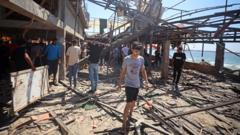Syria has been engulfed in wildfires for six consecutive days, affecting over 14,000 hectares of land, equivalent to the area of Washington, D.C. The fires, primarily located in the mountainous Latakia region, have been exacerbated by prolonged heat and a significant lack of rainfall, leading meteorologists to declare this drought as the worst in recent memory.
Wildfires Rage in Syria Amidst Severe Drought

Wildfires Rage in Syria Amidst Severe Drought
Syria faces devastating wildfires fueled by the worst drought in decades, affecting thousands and exacerbating the country's ongoing challenges.
According to the United Nations, the impact of these blazes is being felt by thousands of Syrians, with many families forced to evacuate their homes. This crisis comes as the country grapples with the aftermath of a devastating 13-year civil war and attempts to stabilize its political landscape under new leadership.
The Syrian Civil Defense, commonly known as the White Helmets, now faces the task of battling these wildfires, a vastly different role from their previous focus on rescue operations in war-torn areas. However, crippling economic sanctions on the Assad regime have severely diminished the resources available to emergency responders. Challenges such as inadequate supplies of diesel fuel and missing spare parts for firefighting equipment have significantly obstructed their efforts. Additionally, the rough terrain remains littered with unexploded ordnance from past conflicts, complicating their work further.
Historically, the coastal region, which is home to a large Alawite population and known for its loyalty to the Assad regime, has recently seen increasing instability. This includes a troubling episode of mass sectarian violence in March that resulted in around 1,600 fatalities, primarily among Alawites, highlighting the ongoing strife and danger that continues to plague Syria despite efforts towards recovery and stabilization.
The Syrian Civil Defense, commonly known as the White Helmets, now faces the task of battling these wildfires, a vastly different role from their previous focus on rescue operations in war-torn areas. However, crippling economic sanctions on the Assad regime have severely diminished the resources available to emergency responders. Challenges such as inadequate supplies of diesel fuel and missing spare parts for firefighting equipment have significantly obstructed their efforts. Additionally, the rough terrain remains littered with unexploded ordnance from past conflicts, complicating their work further.
Historically, the coastal region, which is home to a large Alawite population and known for its loyalty to the Assad regime, has recently seen increasing instability. This includes a troubling episode of mass sectarian violence in March that resulted in around 1,600 fatalities, primarily among Alawites, highlighting the ongoing strife and danger that continues to plague Syria despite efforts towards recovery and stabilization.




















